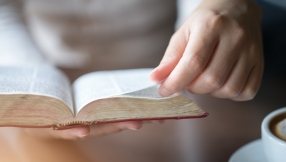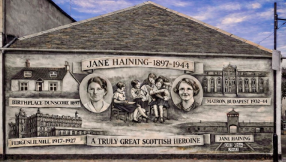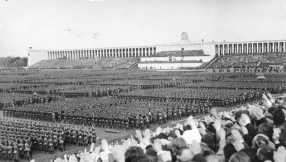Rev David Coffey Shares His Feelings Ahead of Pilgrimage to Bethlehem
|PIC1|As the number of pilgrims to Bethlehem continues to drop and Christians continue to leave the Holy Land in large numbers, Rev Coffey called for more Christians to follow the example of the leaders and show solidarity with their brothers and sisters in Christ by visiting Bethlehem.
During their visit, the ecumenical group plans to meet and hear the experiences of the Evangelical Local Council of Churches of the Holy Land (ELCCHL). They also hope to meet with the author of Bethlehem Besieged, Lutheran Pastor Mitri Raheb, who paints in his book an intimate portrait of Palestinian life under occupation.
The ecumenical group will be in the Holy Land until their return to the UK on Christmas Eve.
CT: You are embarking on this pilgrimage with the Archbishop of Canterbury, the Archbishop of Westminster, and the head of the Armenian Church of Great Britain. You must all be feeling a great sense of urgency to be in Bethlehem at this time? Why did you feel it was necessary to go and to be there?
DC: There are two reasons. One is that we meet regularly as the four co-presidents of Churches Together in England for prayer, reflection and talking together and rather than just always meet around a table we decided two years ago it would be good to walk together somewhere. So we went and visited a parish in the Greenwich area of East London and that was really good because we are essentially Christian pastors and our heart is for God's mission wherever that takes place.
Then, earlier this year when we were talking together in mid-summer we did express concern about the Christians of the Holy Land and somewhere in the conversation it was suggested that we had walked around a parish in East London so why not walk around the Holy Land. I think on that basis, we decided a good time to go would be around Christmas time.
Second to that, we had a standing invitation from the Christians of the Holy Land to come and see them so those two ideas came together. All four of us have been to the Holy Land before but I have never been to the Holy Land at this time of year. At any time it is a privilege to go and visit the sites of our Lord Jesus but to go at this time is a particularly wonderful privilege.
How do you feel about the Israeli security wall that surrounds Bethlehem and the checkpoints which the people of the town have to pass in and out of?
I think part of the reason we are going is to show solidarity with a besieged town. We feel deeply concerned about the suffering that is being caused by the poverty, the unemployment, the lack of tourists, of Christian pilgrims who go and don't even stay the night. We intend to stay two nights in Bethlehem and we support the Open Bethlehem project. I think to just go and listen is so important. I am trying to drill it into myself that I am going as an act of solidarity alongside the act of pilgrimage but I am also going to be a listening believer, to listen to what it is like. I will only be there three or four days and I'll be in and out and back home to safety. I want to go and listen to those who will not leave as I do and enjoy the security I have.
I have been this year to Vietnam and to Moscow and I have met with friends I met when they were not free and the wonderful grace and gift of God for those who are living under extreme pressure - and remember there are Christians on both sides of the wall and my heart is for those who live in Israel as well as Palestine - but the gift of hope seems to come in an abundant measure to those who seem bereft of hope. We look at a situation humanly and say that looks hopeless. But the gift of hope is to demonstrate in a hopeless situation that this is a hope that is beyond human understanding. The peace that is beyond human understanding is also the gift of hope and joy and love. That fruit of the Spirit that we know is at the heart of Christian discipleship seems to flower in situations like that rather than be crushed. So I am going to listen and to learn and certainly be inspired.
How optimistic are you that 2007 will bring some positive developments in this respect?
I think you always have to be positive because in our lifetime we have lived through the end of apartheid in South Africa and seen the Berlin Wall come down and those great historic events were really unthinkable in the darkest days of apartheid in South Africa and the darkest days of Communism in Eastern Europe, we just never dreamt of it although we hoped beyond hope that something would happen. So there has always got to be a possibility.
I have been reading the Advent Story again and I was reading in the Psalms again how the ministry of the Son of Righteousness who is going to come, the righteous branch who we now know is Jesus, would be to stand alongside the poor, bring justice and banish the oppressor. So there is a very earthly aspect. We don't just sing beautiful carols! The coming of the King is the breaking in of the Kingdom. I can't say when God's Kingdom will break in but I just pray there will be breaking in.
There are suffering people on all sides; people in Israel have suffered and people in Palestine have suffered, and for the sake of ordinary people, Lord give us peace in our time. That would be my prayer.
The link with the peace plan for Iraq you can't in many ways separate. If we were able to, by God's grace, see a miracle of lasting peace come to Israel and Palestine that would have a knock on effect on the conflict in Iraq. So I do have hope.
I think as Christians, if we can't have hope in Advent when can we have hope? Advent is the season of hope, when we remember God's promises being fulfilled in the past and we pray, do it in our time Lord.
There has been a steady exodus of Christians from Bethlehem and there are great concerns about the dwindling Christian population in the Holy Land. How concerned are you by this?
I think that is a deep concern. I read something like 20,000 have left over the past few years. That is a deep concern. I don't judge those people. Only when you are in a situation like that are you entitled to say that this is the reason I have taken these decisions.
I think that with all the problems of the world we sometimes get accustomed to the plight of the Christians of the Holy Land and I think there has been a neglect to pray for them. And I think there ought to be a greater focus on prayer for them. If you are going through a hard time, sometimes just to have the encouragement of a friend is enough to keep you at your post and enable you to persevere because you can say, 'I am not alone in this.' And I just hope that some of these dear Christian friends who have felt they can take no more have not felt neglected, and I sense from my own friends in Palestine that they do feel neglected, that other world events have detracted. I hope in the small world in which I live I will be able to focus my prayers on them.
In my church in Didcot, Oxfordshire, my pastor asked me to come up and they prayed for me before I set out. The Christian church worldwide is made up hundreds and thousands of tiny communities like the one I am part of and it is when those tiny communities see themselves as a mustard seed which, if it is planted into good soil, great fruit will come from it, and that is what I am hoping, that the vision will be taken up by small churches.
My grandchildren went to their school and each of their classes signed cards and I am taking those cards with me and there will be times when I will be meeting with children. Fifty per cent of the population is under the age of 15. That is a huge percentage of the population. I hope these little personal dimensions will bring joy to them because the suffering of feeling forgotten is a terrible suffering.
How do you think Christians here in the UK have taken to the situation facing Christians in Bethlehem? Do you think Christians here feel enough of a responsibility towards Christians in Bethlehem; are they active enough in supporting them?
I can't answer for all the Christians in the UK but I can speak from my own perspective and it was only knowing I was going and preparing myself for this journey that I realised it is already a very serious humanitarian crisis in Palestine, the whole of Gaza and the West Bank. Because of unemployment and the situation they are living in, it is a very critical situation. I think preparing myself for the journey has reminded me of that and it isn't a deliberate forgetfulness but more 'out of sight and out of mind'.
There is a film crew and there is definitely hope this will be shown on television in the New Year and that will enable a wider story to be told of the Christians in the Holy Land.
What message will you be bringing to Christian leaders in the Holy Land and members of the Christian community, particularly those who may be tempted to leave as so many have done already?
|QUOTE|The message we will share with one another is the message of Advent. We are going as pilgrims. I have been as a pilgrim before and when you go as a pilgrim you stop at the holy sites, read the Scriptures and you pray. That is what we are going to do. We are going to have our own walking nativity over a period of four days. Each day will begin with prayer and end with prayer. There is a sense in which the message will be a shared message, the message of Scripture, the message of praying together.
I don't think I could give any advice. Just as if I am in a situation having to make a decision, only I with my family and friends can make that decision. What I can do is listen and show solidarity and I wouldn't begin to give advice unless it is asked for.
How do you think your experience in Bethlehem is going to shape your own celebrations of Christmas this year and impact you on your return?
This year I celebrated my 65th birthday and I can't say I remember the early Christmases but I think for all the Christmases I can remember and as a pastor I have led congregations many times I can't think of a time when my mind has been so focussed and to even sing 'O little town of Bethlehem', I already feel a warming of the heart and exciting of the mind in preparing.
I travel a lot and however much you prepare there are those little surprises that happen in the journey and that's true of the Christian life. You commit yourself to a journey and God walks with you and there are surprises along the way. I am ready for that and my heart is prepared that every day we should say that this day is a new day given by God, we should never just sleepwalk into a day. And with this journey I want to prepare my heart and say, "David each day is a new day and will bring its surprises." I want to be open to that.
So I think it will be a memorable journey. When I prayed this morning with my wife we prayed not only that the Lord bless us for the journey but also for the return, to know what to do and what to say when we return.
You are Moderator of the Free Churches and President of the BWA. Are you going to be encouraging members of these churches to be doing the same thing and go on a pilgrimage to Bethlehem?
I think so. I am hoping that what we do will serve as an example. Because there is no doubt about it that the Christian pilgrims have dropped off in large numbers. And what we want to say is that, if you want to show real solidarity with brothers and sisters in Christ in the Holy Land then go and visit them - as we used to. It used to be very much a part of the Christian experience and for some reason we have backed off from that.
So yes, we are hoping it will have that knock-on effect, especially going to the most besieged parts of the Holy Land and to meet with believers there. We must remember to pray for all sides but I think sometimes in our praying for the situation in the Middle East the ones who have been most forgotten and most neglected are the Christians of Palestine. Bethlehem for me is a symbol of the many communities where there are Arab Christians who meet and pray. They pray for all of Israel, that's the important part.
I am going to meet the Israel Baptist Convention. It is a very spiritually vibrant group of people so my prayer is for them and they feel squeezed. They are not Jews and they are not Muslims. And sometimes the Christian community does feel squeezed in that situation so let's pray for them. And what a great time to pray for them! I am saying to folk, when you sing 'O little town of Bethlehem' remember we are not just looking back, we are saying 'O little town of Bethlehem' we still remember you today.













